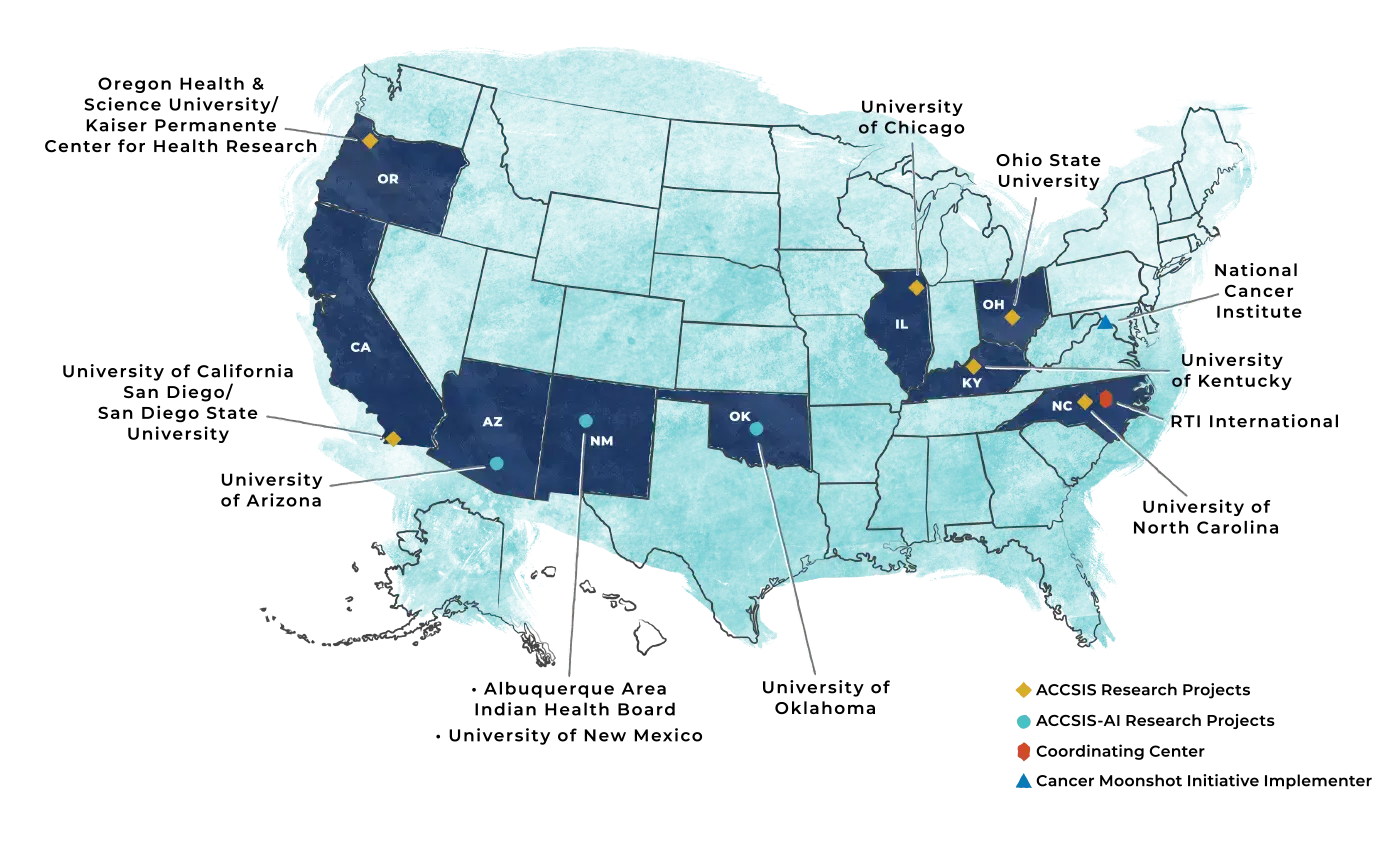Story 01
Also related to Prevent Cancer
Summary
The NCI Inherited Cancer Syndrome Collaborative (ICSC) conducts studies of genetic risk assessment, communication, and testing uptake to increase early cancer detection and survivorship.
Current State
Inherited genetic factors increase the risk for some cancers, and people with inherited risk syndromes require knowledge of this increased risk and increased monitoring and risk-reducing strategies. By identifying new ways to increase the uptake of proven prevention approaches, especially in medically underserved populations, more research in implementation science and targeted interventions could significantly reduce cancer incidence and death from cancer.
Strategy
Partner with providers, researchers, and communities at increased risk for cancer to improve screening rates.
DCCPS Contribution
DCCPS supports the ICSC in response to the Cancer Moonshot initiative to increase the detection of inherited cancer syndromes and support cancer prevention and early detection through risk assessment, genetic testing and counseling, and personalized decision-making. Through this collaborative network of 38 studies, the ICSC is testing strategies to collect family history, integrate risk alerts into health records, augment genetic counseling and testing, engage at-risk family members, and support cancer prevention and early detection at the clinic, health care system, and community levels.
These partnerships bring providers, genetic counselors, researchers, and communities together through annual investigator meetings, working groups, and public webinars and support cross-collaborations through sharing of measures, tools, and methods to overcome unexpected study barriers and promote rapid translation of study results. Identifying those with inherited cancer syndromes is key to early cancer detection, including reaching all communities with culturally appropriate information, genetic counseling and testing, cancer screening services, and follow-up care.

Story 02
Summary
Through the Accelerating Colorectal Cancer Screening and follow-up through Implementation Science (ACCSIS) initiative, NCI is working with local partners to improve colorectal cancer screening, follow-up, and referral for care among populations that have low colorectal cancer screening rates.
Current State
Many more Americans could benefit from screening for colorectal cancer. Safe, effective screening and tests following any abnormal results are widely available. But many eligible people are not participating. We need to better understand why some people are not screened and how to be sure abnormalities are appropriately followed up. We also need to increase screening among those at highest risk in order to reduce health inequities.
Strategy
Partner with providers, researchers, and communities at increased risk for cancer to improve rates of screening and follow-up.
DCCPS Contribution
Colorectal cancer (CRC) is the second leading cause of cancer deaths in the United States, even though good tests are available to screen healthy people and follow-up on any abnormalities. As of 2021, more than 70% of eligible adults were up to date with the recommended CRC screening, but this national average masks two issues. First, people who are not up to date are often from traditionally underserved and marginalized populations, such as those residing in rural areas, racial and ethnic minority populations, and low-income populations. These screening disparities contribute to unequal risks of death from CRC. Second, data showing use of screening do not account for the necessary follow-up tests, when screening finds an abnormality, nor for access to treatment. Screening can only benefit those who get the needed treatment.
Together, these challenges highlight the importance of improving CRC screening, follow-up, and referral to care among populations for whom screening rates are below national standards. Following a recommendation from the Cancer Moonshot Blue Ribbon Panel, NCI funded eight research projects to work on these challenges. This collaboration, called ACCSIS, has been working with communities who could benefit from more CRC screening. Each project focuses on local strengths and challenges, and they share with each other what is working. The ACCSIS teams collaborate with communities across the United States, including urban and rural and White, Black, Hispanic, and American Indian, who receive care at public and private health care clinics.
In each community, the researchers are borrowing from screening programs that have been successful elsewhere and adapting those programs for the local situations. The projects are nearing the end of their funding and are still working to assess how effective the interventions were at increasing CRC screening, follow-up, and treatment rates. But, along the way, all of the projects have been sharing information on what approaches they are using, what challenges they have encountered (and solutions), what adaptations they are making, and what new ideas have come from their communities.
Publications and conference presentations describing these comparisons include versions of patient navigation, ways to mail self-sampling CRC kits to people at home, and thoughtful ways to adapt interventions that have worked in other settings. Other findings will share ways to use electronic health records (EHRs) to see what screening is needed, what tests have been done, and which patients need additional tests or treatment. These EHRs are common in the United States but vary widely; the ACCSIS projects will provide new insight into using them to improve CRC rates. The ACCSIS projects would not have been possible without collaboration with dozens of community partners, including local clinic staff and doctors, frontier health systems that support rural clinics, academic partners, and urban and rural clinics using both public and private funds. The ACCSIS projects have worked continually to improve CRC screening rates and compare their experiences so that future CRC and other types of cancer screening and follow-up programs are easier to plan and more likely to succeed across the US.

Continue To
